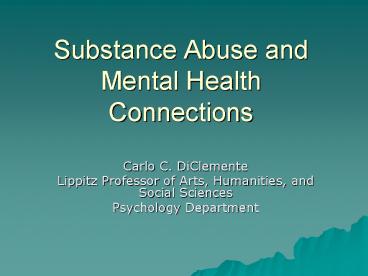Substance Abuse and Mental Health Connections - PowerPoint PPT Presentation
1 / 15
Title:
Substance Abuse and Mental Health Connections
Description:
A substance abuse problem increases the risk for mental health problems ... Lifetime Substance Use Disorder doubles the odds for depression ... – PowerPoint PPT presentation
Number of Views:70
Avg rating:3.0/5.0
Title: Substance Abuse and Mental Health Connections
1
Substance Abuse and Mental Health Connections
- Carlo C. DiClemente
- Lippitz Professor of Arts, Humanities, and Social
Sciences - Psychology Department
2
Overview
- Interactions between
- alcohol and/or substance use and
- emotional and psychological problems
- are many and varied.
- Epidemiology
- Types of interactions
- College connections
3
Lifetime Prevalence - Psychiatric Substance
Abuse Disorders-2007
- Any Anxiety Disorder
- Any Mood Disorder
- Any Impulse Control Disorder
- Any Substance Disorder
- Any Disorder
- Males 25.4
- Females 36.4
- Males 17.5
- Females 24.9
- Males 28.6
- Females 21.6
- Males 41.8
- Females 29.6
- Males 58.4
- Females 56.5
National Household Survey on Drug Use
4
12 Month Prevalence - 2007
- Any Disorder
- Any Substance Disorder (SUD)
- Males - 29.9
- Females - 34.7
- 18-29 - 43.8
- Males - 15.4
- Females 11.6
- 18-29 22
National Household Survey on Drug Use
5
Models for Interactions
- A mental health problem increases the risk for
substance use and dependence (secondary substance
abuse model) - A substance abuse problem increases the risk for
mental health problems (secondary psychopathology
model) - Both are caused by a common underlying factor
(common factor model) - Whichever one comes first there is an interaction
between them so that one influences the other
which in turn impacts the first in a negative
feedback loop (bi-directional model) - Two independent events (independence model)
6
Mental Health Substance Abuse
- 29 of mentally ill abuse either alcohol or drugs
- 47 of individuals with schizophrenia also have a
substance abuse disorder (four times the general
population) - 61 of individuals with bipolar disorder also
have a substance abuse disorder (five times the
general population)
7
Substance Abuse and Mental Illness
- 37 of alcohol abusers 53 of drug abusers have
at least one serious mental illness - Lifetime Substance Use Disorder doubles the odds
for depression - There are significant positive relationships
between SUD and both mood and anxiety disorders
8
Secondary PsychopathologySubstance Abuse
Causing Psychiatric Disorders
- Some substances have reactions that mimic or
trigger serious psychiatric symptoms (paranoia,
hallucinations) - Some drugs can cause temporary organic brain
syndromes (intoxication, blackouts, delirium) - Some drugs can cause or trigger anxiety or
depression episodes that last well beyond the
drug use.
9
Secondary Substance Abuse ModelManaging Life
Stress and Problems
- Many individuals try to self medicate
psychological and emotional distress with
prescription and illegal drug use - Some use drugs to escape from reality
- Drugs and alcohol are used to cope with impulse
and anger management and contribute to risky
behaviors and violence - Some use drugs to enhance performance to meet
some difficult goal or to reach some
(unattainable?) expectation
10
Common Factors Model Preexisting Vulnerability
or Problems
- At times addictive behaviors and mental illness
emerge from some common source - Emotional, physical or sexual abuse
- Traumatic events
- Genetic vulnerability/family heritage
- Two elements of a more chaotic lifestyle related
to a developing personality disorder
11
Bi-Directional Models
- Psychiatric symptoms can more easily be explained
when using drugs - Stigma of psychiatric problem is relieved by
hanging out with substance abusers which
increases substance use which exacerbates
psychiatric problem.. - Usually negative spiral of events ensues
12
College Connections How is This Relevant to
College Students
- College students come to college with personal
experiences with mental illness and substance
abuse (direct or indirect) - College is a transformational experience that
produces growth and includes stressful
experiences that challenge mental and physical
health - Family, friends, peers, mentors offer messages
and models about psychological health and
substance use that we struggle with
13
How is This Relevant for College Mental Health
- Experimenting and exploring our thoughts and
behaviors is normative - Learning about strengths and weaknesses, how to
cope successfully with failure and success, and
what we can and cannot accomplish or tolerate is
a critical part of this experience
14
College, Substances, and Stress
- Late adolescence (18 26) is often a confusing
time with unique stressors, significant
challenges to our sense of identity belonging,
and experimentation - Substance use can complicate and distort these
experiences - Individuals experiencing psychological and
emotional problems are at higher risk for abuse
and dependence on alcohol and drugs and vice
versa - Alcohol and drugs become problems when they are
used to cope with stress and manage college tasks
15
Take Away Messages
- Be aware of the connections between substance
abuse and psychiatric symptoms and syndromes - Individuals who may be abusing substances
(including alcohol) may also be experiencing
serious emotional or psychological problems - Seek help for yourself or others when the first
signs of either or both types of problems emerge - Early intervention is the best way to short
circuit the negative interactions no matter which
causative model is operative.































